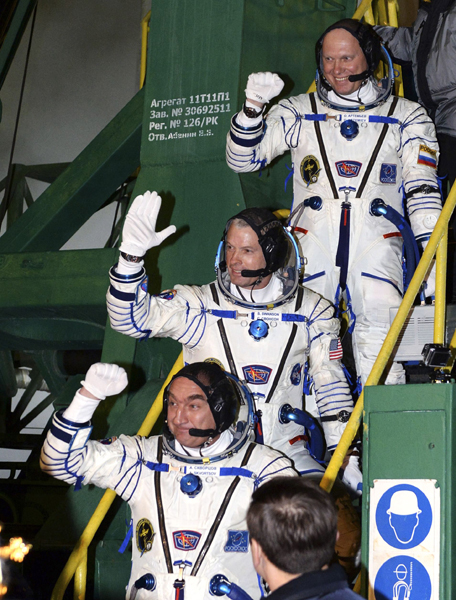Malfunction delays dock at space lab
By Agencies in Moscow (China Daily) Updated: 2014-03-27 08:52
Members of the International Space Station crew, Russians Alexander Skvortsov (bottom) and Oleg Artemyev (top) and US astronaut Steven Swanson (center) before the launch at the Baikonur cosmodrome on Wednesday. Vasily Maximov / Reuters

Crew of three must orbit 34 times before second attempt on Friday
A US-Russian space crew faced an unprecedented two-day delay in docking with the International Space Station on Wednesday after their Russian Soyuz spacecraft experienced a technical glitch during its approach.
The two Russian cosmonauts and one US astronaut aboard were scheduled to dock with the station early on Wednesday, just six hours after launch from Kazakhstan, but the problem delayed the maneuver until Friday.
The delay means that the trio will orbit the Earth 34 more times before their next rendezvous with the orbiting laboratory, instead of the fast-track route of four orbits that was originally envisaged.
Russians Alexander Skvortsov and Oleg Artemyev, along with Steve Swanson of NASA, had earlier taken off from Russia's Baikonur cosmodrome in Kazakhstan in a spectacular nighttime launch that went smoothly.
The issue appeared to arise after their Soyuz capsule entered orbit and a thruster failed to fire to assist in the docking approach.
NASA and the Russian space agency Roscosmos announced that the planned docking had been delayed after a 24-second engine burn necessary to adjust the spacecraft's orbiting path "did not occur as planned".
NASA said in a statement on its website that the Soyuz "was unable to complete its third thruster burn to fine-tune its approach".
The crew had been using a fast-track approach to the space station that Russia has employed since 2013. In response to the problem, they are now using the traditional longer approach that was employed up to 2012.
"Rendezvous experts are reviewing the plan, and may update it later as necessary," NASA said, adding that the three spacemen were "in good spirits".
NASA said Russian flight controllers were reviewing data to work out why the third thruster burn did not occur as planned.
"Initial information indicates the problem may have been that the spacecraft was not in the proper attitude, or orientation, for the burn," NASA said.
The head of Roscosmos, Oleg Ostapenko, said the problem appeared to have been triggered by a glitch in the orientation system.
"The crew have taken off their space suits and are continuing their flight normally," he said.
The head of the Russian rocket firm Energia, which supplied the rocket that propelled the craft into space, however, said that the origin of the problem was not yet clear.
"It could be mathematics; it could be a transmitter problem; or that the engine choked. But most likely it was a mathematical problem," Vitaly Lopota told the Interfax News Agency.
This would imply that ground scientists failed to work out the correct altitude in orbit for the thruster to fire to take the Soyuz to the space station.
Roscosmos said that the docking was now provisionally expected at 3:58 am Moscow time on Friday.
After the retirement of the US space shuttle, NASA became wholly reliant on Russia for delivering astronauts to the space station on its tried-and-trusted Soyuz launch and capsule system.
US-Russia space cooperation has continued undimmed despite the diplomatic standoff over Ukraine, and the joint work is seen as one of the success stories in post Cold War bilateral ties.
At the preflight news conference at Russia's Baikonur cosmodrome in Kazakhstan, senior astronauts Skvortsov and Swanson said they had decided to have dinners together on board the space station "as an opportunity to come together as friends in the kitchen and look each other in the eye".
Swanson also paid homage to Yuri Gagarin, the Soviet cosmonaut who became the first man in space in 1961 with his flight from Baikonur.
"Yuri is a symbol for the whole world. I am proud to be part of history here," Swanson said.
AFP - AP










